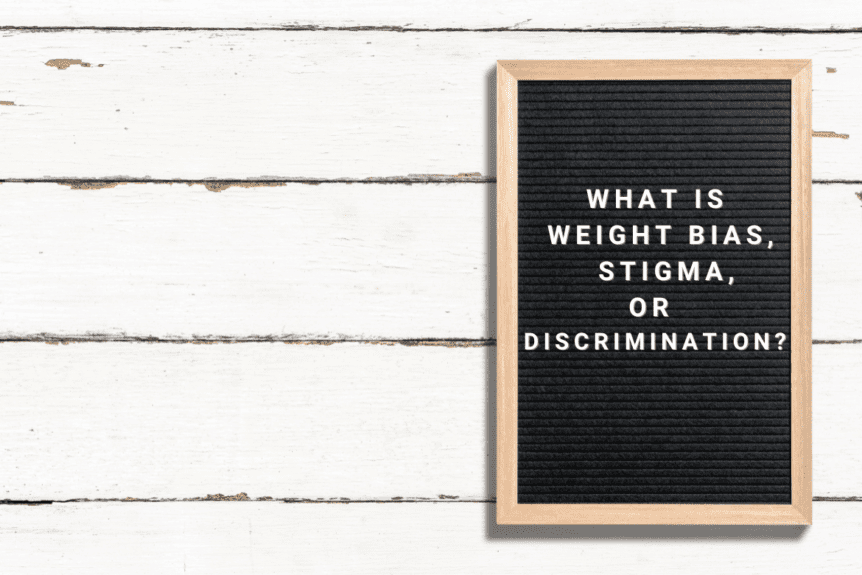When people talk about obesity, they are often focused on what people eat and how much they move. However, obesity is an incredibly complex chronic health condition! One piece that often gets missed in obesity-talk is the very important issue of weight bias (sometimes called weight stigma) and discrimination. Organizations like Obesity Canada, Obesity Action Coalition and University of Connecticut Rudd Centre are working towards bringing these issues to the forefront of how we talk about (and thus understand) obesity. Increasingly, weight bias and stigma are becoming central issues addressed in policy debate and research on obesity management.
Weight Bias, stigma and discrimination show up as negative beliefs, judgements, stereotypes, assumptions, and/or attitudes towards people living in larger bodies. For example, people might assume that excess weight is caused by lack of self-control or willpower.
For people living with obesity, weight bias may be experienced in many settings from their workplace, the healthcare system, educational settings, family and friends, as well as in the news, television shows, movies, and on social media.
Why is this a critical issue we should be talking about?
- For people living with Obesity, the experience of weight bias can significantly impact quality of life, mental and psychological health, and physical health as well.
- Psychological outcomes can include depression, anxiety, lower self-esteem, and poor body image. A negative impact on quality of relationships has been noted as well.
- Physical health outcomes are impacted by avoidance of health care, avoidance of or disengagement from physical activity, unhealthy weight control practices, and/or the development of eating disorders such as binge eating.
What can you do if you’re experiencing these issues?
- Talk to someone who can help support you through coping and dealing with weight bias such as a Registered Dietitian or Psychologist.
- Build the right support team. Surround yourself with people who are respectful and who listen to you.
- Become your own advocate and stand up to people who seem to be treating you differently. Obesity Canada has a program called EVERYBODY Matters where you have an opportunity to share your stories and lived experience: https://obesitycanada.ca/weight-bias/weight-of-living/
- Develop strategies that promote positive self-talk, self-esteem, and confidence.
- Set goals for yourself in areas that are enjoyable for you to work on.
It can be difficult and challenging to learn how to advocate for yourself, especially if you have a history of being treated as though you are “less than.” It is important to remember, however, that YOU MATTER and deserve to be treated with dignity simply because you exist!
– Registered Dietitian (Nutritionist)
References and Resources for more Information:
Obesity Canada: https://obesitycanada.ca/weight-bias/
Obesity Canada Practice Guidelines: https://obesitycanada.ca/wp-content/uploads/2021/05/1-Reducing-Weight-Bias-v6-with-links-1-1.pdf
Obesity Action Coalition Centre: https://www.obesityaction.org/
RUDD Centre: https://uconnruddcenter.org/research/weight-bias-stigma#



